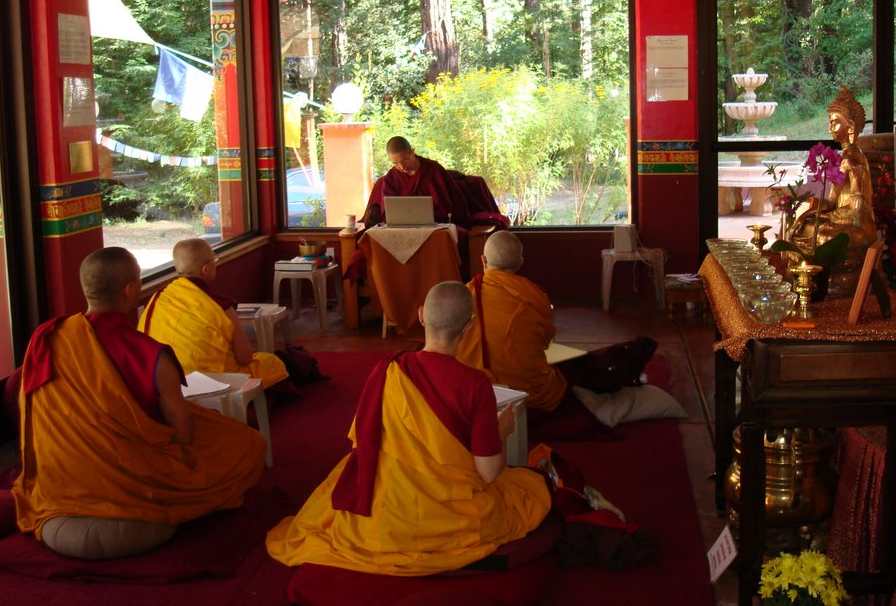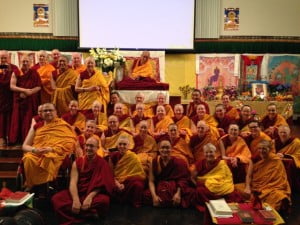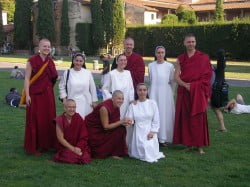When we ordain we commit to becoming enlightened through the monastic vessel, and this means you will need to be trained. The Buddha created a Sangha as a fast track to Enlightenment.
Training for Community Life
An Interview with Sister Jotika
IMI spent time with Sister Jotika to reflect on what motivates her commitment to training new monastics, and why she puts so much emphasis on community living.
How has the experience of growing up in the convent school informed what you’re doing today?
Those nuns were my role models growing up and still are. Often in the Buddhist traditions we hear that women are not able to live together or are only able to live together if they there is a male figure on whom they can depend on and who is the authority figure. But that is not my experience. The nuns in the convent taught me that nuns can build successful and harmonious communities. They were competent, intelligent and independent women fully dedicated to their teaching and to their spiritual life. They instilled in us a sense of being able to do anything we set our minds to. We were all responsible for the well being of the group. I learned about community without consciously learning it. They were trained on how to get a class of thirty young women to be united and successful – intellectually and spiritually. I also saw that the flavor of the community changing with the change of director or abbess. Some were sterner while others more exuberant but they all had harmony and the welfare of the community as their prime objective even if tinted by their personalities. So the question I have is, are Christian nuns able to create and live in harmonious communities and Buddhist nuns not so? Why? If what we share is that we are all women, it cannot be on account of our gender. This opens a lot of questions.
Sometime after I ordained in 1983 in England I remembered what I had learned at convent school. As time went by two things became clear, firstly, the importance of the Vinaya for a Buddhist monastic and second the role of the teacher or guide of the community.
What is the cornerstone of a community?
Any group or community, whether spiritual or worldly, needs to be guided by rules that every individual vows to keep, otherwise is anarchy. A group or a community grows around a leader or elder. Buddhist monks and nuns ultimately follow the Buddha. He left us the rules by which to guide ourselves and the community. We do not have to invent the rules or fight about who is making the rules or which rules we are going to follow. He laid them down for us and this is what we promise to keep when we ordain. When we ordain we join the Buddha’s club, we accept its rules; the club already has its governing rules for the individual as well as for the community. If we do not want to keep the rules then we should not join the club. It is voluntary.
When the Buddha was asked who would guide the community after he was gone his reply was that the Dharma-Vinaya would be our guide. So it is very clear.
If the Buddha left the Dharma-Vinaya as the guide for the monastics what is the role of the teacher?
The teacher is the guiding force within a monastic community. The real guide is the Buddha, he said to follow the Vinaya and the teacher shows us how to train our mind using the Vinaya in a very practical way. The teacher has the ability to see things in a wider perspective, guiding and supervising the community as a whole and able to guide us through our dark moments. A community needs a teacher within to guide it in achieving its goal.
What is the goal of a monastic community?
 When we ordain as monastics we take the vows of individual liberations. We take them with a Mahayana attitude but they are the vows of individual liberation. What we vow at that moment is to attain enlightenment for the benefit of all being using as our support the vows of individual liberation. That is the ultimate goal of monastic life. There is a lot of confusion about this. A lot of people ordain because they want to practice Dharma. To practice Dharma is not necessary to take the vows of individual liberation. You can practice using the bodhisattva or tantric vows. Ordaining as a monastic is meant to be used for the purpose the Buddha set it up. A more immediate goal is the harmony and welfare of the community. If everybody is working on the ultimate goal the immediate one does not pose impossible problems, difficult maybe, but not impossible.
When we ordain as monastics we take the vows of individual liberations. We take them with a Mahayana attitude but they are the vows of individual liberation. What we vow at that moment is to attain enlightenment for the benefit of all being using as our support the vows of individual liberation. That is the ultimate goal of monastic life. There is a lot of confusion about this. A lot of people ordain because they want to practice Dharma. To practice Dharma is not necessary to take the vows of individual liberation. You can practice using the bodhisattva or tantric vows. Ordaining as a monastic is meant to be used for the purpose the Buddha set it up. A more immediate goal is the harmony and welfare of the community. If everybody is working on the ultimate goal the immediate one does not pose impossible problems, difficult maybe, but not impossible.
How do you use the Vinaya for the goal of liberation?
When we ordain we commit to becoming enlightened using the monastic vessel. The Buddha created the Sangha as a fast track to Enlightenment as we can dedicate one hundred percent of our time to achieving the goal. The lay Buddhist have family and jobs concerns and even if they have the goal in mind they do not have the time or the environment to do it. When we take the vows we say that we are going to live by the rules that the Buddha set, the Vinaya, to achieve this goal.
The Buddha gave 10 reasons for living the Vinaya but a simplification of these 10 reasons would be training the mind, and the simplicity of life. Again the teacher or leader of the community ensures that the Vinaya is being used for the right purpose. Not as a repressive tool to make everyone uptight but to help, support and guide us in our endeavor.
What is the role of individual Sangha members in a community?
Sangha literally means community. You are living with other nuns or monks who are upholding the same spiritual goal, values and code of conduct, and in time some will become your spiritual friends, what the Buddha described as the kalyanamitra. You are practicing together, working and sharing resources. It’s not a group of individuals coming together and defending their own patch. It’s about being together to train the mind and be of service to the lay and monastic community.
If we establish the right relationship, we offer spiritual support and guidance to the lay people and in return the lay community provides us with material and financial support. This is an interdependent relationship that is balanced. The monastics don’t need to be closed off and separated from the world. When you are a junior monastic is good to be protected by the senior monastic community and, ideally, you will not be given teaching duties and jobs that may have to do with the lay community for some years. But when the teacher feels you are ready and you on your side you are willing, your work with the community at large begins.
On a broader perspective the role of all the monastics is to care of the monastery, doing whatever jobs are needed or allocated to them plus taking care of their studies and meditation practice. Most decisions taken by the leader of a community are taken in consultation with the rest of the members. The Buddha established the first democracy and like in a worldly democracy it also needs a president or prime minister, abbot or abbess.
How does a teacher know you are ready?
The Buddha said that when we ordain we should remain under the guidance of a teacher for 5 years. So for five years you are considered a junior. After that you are in the middle and after 10 years you are a senior. Your teacher may think that you are ready to go out and teach before the 5 years are over, or not. Then you can work to help the lay community in whatever capacity is needed and also according to your personal gifts. You can give back to the lay community in spiritual terms the support they have given you in supporting your physical needs. Sometimes monastics are not ready to go into the lay community and they shouldn’t. There is nothing more depressing for the lay community than seeing a frustrated and angry monk or nun. When we ordain we accept the responsibility that comes with wearing these robes. If on account of our bad behavior if we break the faith of the lay people in the Three Jewels we have broken a vow. It happens more often than we think.
Can we create monastic communities in the West?
The Buddha did not create the Sangha just for Asians. From my point of view it’s not about if we can create communities in the West. How can we afford not to create them? I don’t think we can afford not to create them. There is too much at risk. The Sangha is the repository of the Dharma. It has been transmitted that way for more than 2500 years. If there are no Western Sangha properly established in the West, living in functioning monastic communities that are abiding by the Vinaya, the future of the Tibetan Buddhist tradition in the West is in danger. If we continue the trend of living like lay people – in our house, keeping our job, car, money etc – the Dharma in the West will not live long. The Buddha described that kind of life as the life of a householder and monastics are meant to abandon it, this is why we ordain. The Dharma is passed on from one generation to the next by the monastics. If we care about the tradition we have to create monasteries so that the teachings can survive.
The present trend is to live on your own and to keep working, and look where that has taken us over the last 30 years? Where are the monasteries? The Theravada Western tradition came to the West later than the Tibetan tradition and look at how they are thriving and how many monasteries have been set up in UK, Australia, Europe, US and how well supported they are. We need to think about how to change the trend, and create monasteries. If we are convinced that the Buddha’s teachings are of help to humanity, why are Westerners not preserving the teachings for future generations?
How do we determine community well-being?
The well-being of a community is determined by the level of harmonious living. The Buddha described it as milk mixed with milk. The leader nurtures well-being by finding out what’s going on when there is no harmony. People’s minds get clouded, and as a result they speak unskillfully, or need to let go of that which is obstructing them. The teacher can help the individual or the group to see what they are doing.
In practical terms this means that you are able to live with people you like, and are close with, and also with people from a personality point of view, you would not chose to live with. Its easy to live with the ones we like, and the ones we do not like are our great teachers. When we first ordain we are like rough stones with cutting edges. But a few years in the cement mixer, sometimes it feels like that, and we come out much smoother. And all because of those painful bumps.
Often we are selfish, and make it all about me, what I want, when I want it and how I want it but living in the community can show us our selfishness very clearly. It is very humbling. We can also have mild or serious attacks or rebelliousness against everything and everyone. It is just our selfish mind manifesting once again. How would we learn this if we live alone and doing what we want? It is not always easy but its the price we have to pay for being able to train the mind, and pass on the Dharma to the next generation.
What are the benefits of rules in a community?
The Buddha set the rules to restrain our bad behavior and unruly minds, and to make sure that we would not break the faith of the lay supporters. He did not set any rules as long as everybody behaved. When there was a breach in pure behavior then he set a rule, then another and then another until we ended up with over a couple of hundreds or more. This means that even if our heart is set on liberation often our impure and negative minds rule us and we behave in unbecoming ways. Rules for the sake of keeping rules are not important. Rules for the sake of Dharma realization are important. We also have to remember that although the Buddha set a life of restrain for the monks and nuns he was against asceticism for its own sake. So he did not consider the life of a monastic as overly ascetic. As His Holiness said “for those who are not sincere, the rules are a burden”.
Who is the source of your inspiration?
His Holiness the Dalai Lama is my inspiration, main teacher and guide. I want to help the Western Tibetan monastics in whatever way I am able to do, whatever they need.
What are you plans for the future?
I am now going back to Spain. I was donated some land and now we are in the process of building a nunnery that means building permits, architects, builders etc. I am not in favor of a big community. It is too difficult for the lay community to support a large monastic community. We’ll start with a few and build a solid community base, making sure everyone in the community is ok. Why am I doing it? It is my grain of sand to ensure that the Dharma remains and flourishes in the West, as an offering to His Holiness.



